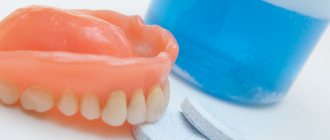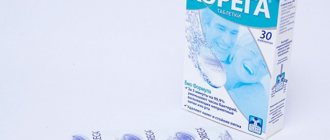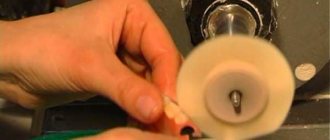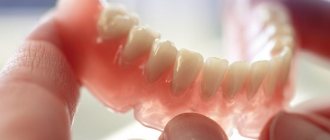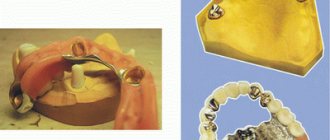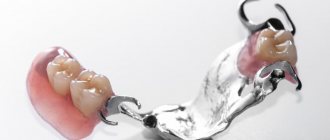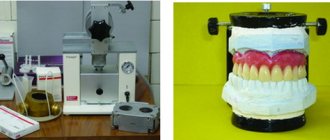September 12, 2019
Owners of removable orthopedic devices are often interested in how to clean their dentures. Indeed, this moment is very important not only for maintaining artificial teeth in perfect condition, for preserving their original beauty, but also for the health of the entire oral cavity. After all, bacterial plaque accumulates on the materials of removable appliances, worsening their condition and provoking the development of inflammatory processes in the living tissues of the oral cavity. Plaque must be removed in a timely manner, and special tablets are best suited for this purpose - there are a large number of different types and brands on pharmacy shelves today.
Tablets are good at cleaning dentures from plaque
We agree that due to the wide variety, it is very difficult to make a choice and find out which tablets are best. The editors of the UltraSmile.ru portal will help you decide on this issue. From the article you will also learn what else cleansing tablets are useful for, what is included in their composition and how to use them correctly to make a difference.
Purpose of cleansers
There are different types of cleaning products for removable dentures. To carry out high-quality hygiene and care for products, you need a whole arsenal of devices and preparations: brushes, paste, various foams, gels and rinses, cleaning tablets, ultrasonic baths.
Read the article on the topic: the most complete list of products for those who have removable dentures.
A very important and indispensable means for cleaning dentures is cleaning tablets; they must be used on an ongoing basis, in fact, just as the rest of the list of hygiene products cannot be excluded. As for cleaning tablets, cleaning dentures with them allows you to avoid a whole range of problems at once:
- elimination of pathogenic microflora: plaque accumulates on dentures, the smallest food residues can get stuck in fastening elements and microcracks invisible to the eye of the product. It may not be possible to remove them with a regular brush and paste, and then the product can become a source of bacterial growth and infection, causing inflammation of the gums and other dental diseases,
- removal of stains and even minor whitening of the crowns of artificial teeth: everyone wants their smile to look beautiful, but not everyone can deny themselves the pleasure of consuming food and drinks with coloring pigments (coffee, berries, tea, soda, juices, sauces). Not everyone can give up the bad habit of smoking. These unfavorable factors gradually lead to a change in the color of artificial crowns, and if you do not periodically use specialized cleaning agents, the appearance of the product will soon deteriorate, and, alas, it will be impossible to whiten it using other methods.
- Extending the service life of products: prostheses contain various fastening elements, which also require specialized care so that they last longer. For example, metal hooks. The tablets will help protect them from corrosion.
What's included
Depending on the manufacturer, cleansing tablets contain various combinations of chemicals combined with refreshing or whitening additives:
- oxidizing agents loosen and help remove plaque;
- Chelates break down organic compounds on the surface of the structure;
- carbonates are used in effervescent tablets;
- active oxygen is used as a disinfectant component;
- dyes are usually blue;
- sodium perborate whitens crowns.
Extracts, menthol or eucalyptus oils are usually used as refreshing additives.
Composition of cleansing tablets
Each manufacturer, of course, has its own special ingredients that others do not have. However, there are components that are most often used for the production of tablets - they are found in one form or another and in concentrations by almost all manufacturers:
- sodium perborate: has a whitening effect,
- citric acid: promotes bleaching of artificial materials, plus enhances the effect of other components included in the composition,
- carbonates: help the effervescent product dissolve very quickly and without residue in water, resulting in a homogeneous solution,
- mint: the most common mint flavor is that it deodorizes well, adds freshness and eliminates unpleasant odors,
- dye: for example, blue - due to it the crowns visually become whiter,
- enzymes: they perform a protective function, because by soaking them from the solution, the removable device literally “repels” bacteria from itself,
- active oxygen: this is a powerful weapon against bacterial plaque control.
And now it’s time to more specifically answer the question of how to clean dentures at home, namely, which tablets will cope with this task most effectively. The review below is based on the opinions of experienced orthopedic dentists and patient reviews.
Corega Tabs Dental White ("Corega")
This well-known brand from GlaxoSmithKline produces a whole series of products for high-quality and gentle oral care. He also presents several types of creams for reliable fixation of removable systems in the oral cavity. As for tablets, they are in demand among patients because... help preserve the original color of artificial teeth, as well as restore it if stains appear on the prosthesis or its shade has changed due to contamination. This product removes bacterial plaque quite effectively. Corega Tabs Dental White is available in packs of 30 and 72. The asking price is from 250 rubles.
Corega Tabs Dental White
To find out the composition and understand how to properly clean dentures at home, read the article on the topic: 5 advantages of Corega tablets for removable dentures.
Protefix
Are you wondering how else to clean your dentures from dark plaque? Judging by the reviews of Internet users, Protefix tablets cope well with this task, which are able to reach contaminants even in the most inaccessible places. This product also effectively combats unpleasant odors due to the components of peppermint and common mint. Protefix can be purchased in packs of 36 and 72 pieces. Their cost starts from 200 rubles.
Protefix tablet
LACALUT Dent
These tablets are not cheap, the cost for 30 pieces in a package starts from 350 rubles, but they help restore the color of artificial teeth, as well as protect it from pigment and plaque accumulation. They disinfect and deodorize well, and remove organic1 residues. The composition contains citric acid, menthol and bleaching sodium perborate. When dissolved, the water turns blue.
LACALUT Dent tablets
Fittydent
The manufacturer positions the product as unique, claiming that it can even cope with the remnants of fixing creams that cannot be removed with other hygiene and care products and do not dissolve in water. If you have decided how to clean your removable dentures and have chosen Fittydent, then after using them you will certainly get a whitening effect and will be glad that the product is no longer a source of bad odor. The asking price is from 300 rubles per pack of 32 tablets.
Fittydent tablets
The Fittident brand is respected in 68 countries around the world; it provides customers with a fairly wide range of products for the care and fixation of removable systems: creams, tablets, pads. Read about the features, advantages and disadvantages of the brand in the article on the website: 4 products from “Fittident” that will improve life with removable dentures.
ROCS (“R.O.K.S.”)
The composition of this product is safe for metal elements of removable devices. The role of the “main violin” here is played by bleaching oxygen, which helps to cope with severe stubborn stains and is able to return artificial crowns to their original whiteness. The composition also contains antibacterial substances that help fight germs that have settled on the surface of the orthopedic structure. Another plus is that the price of this brand is quite reasonable - from 220 rubles for a package consisting of 32 tablets.
ROCS tablets
Dentipur ("Dentipure")
For those who can’t decide how to clean their dentures at home, we recommend trying Dentipyur brand tablets (Germany), which have a very attractive price - about 140 rubles (for 30 pieces). They have antiseptic properties, a whitening effect, and quickly dissolve and soften plaque.
Dentipur tablets
Selecting tools for cleaning the prosthetic structure
Only soft brushes are suitable for cleaning removable dentures. In pharmacies you can buy special instruments designed for these purposes. They are usually equipped with artificial nylon bristles, which do not scratch the base part and crowns, while carefully cleaning all surfaces from dirt. The working part of such brushes consists of two elements, one of which is intended for cleaning the internal areas of the dental structure.
But it is not necessary to buy a special brush for dentures; you can use a regular one. The main thing is that the degree of rigidity is minimal. If the bristles are overly elastic and the effort applied is significant, then after a year or two noticeable scratches will appear on the artificial teeth and gums.
How not to make a mistake with your choice
If you have installed dentures and still don’t know how best to clean them, you can seek advice from your doctor. He will help you choose the product that will be most effective for you. However, it is not always possible to choose your ideal option the first time, and you have to use the trial method. However, when choosing, you should definitely take into account contraindications for use and possible side effects. Sometimes it happens that in some patients tablets of one brand cause allergies and individual intolerance, while in others they do not.
“Before I met Protefix, I always gave preference to Corega - I used all care products only from this brand. It was so convenient and it seemed that it was very correct, because... All products from the same series complement each other. But Protefix won me over the first time - it seemed to me that the results from their use were better, because They were able to remove a stain that the cores couldn’t handle at all.”
Tamara Vitalievna, review from the dental portal gidpozubam.ru
How to choose a product to care for removable dentures
It is unlikely that anyone knows better than doctors all the nuances of using certain prostheses and care products. By looking at the clinical picture, a professional doctor can suggest the most effective drugs. It is also worth carefully studying the components. Despite the fact that most drugs are positioned as hypoallergenic, individual intolerance has not been canceled.
For comprehensive care, it is advisable to use products from one manufacturer (paste for mechanical cleaning and tablets). However, the patient will have to determine the ideal remedy through trial and error. You should always pay close attention to the list of contraindications. In addition, each drug must first be tested for an allergic reaction. There is no single remedy that suits everyone; if one patient does not get enough of it, then another may experience side effects from the same medicine, or, moreover, individual intolerance.
Doctors recommend carefully studying the composition of the tablets before you start using them. The instructions for the drug, which indicate side effects and contraindications, will help them with this. Most pills are considered hypoallergenic, but the human body is unpredictable and can produce an individual reaction. In addition, the compatibility of tablets for the care of removable dentures with medications that the patient takes for chronic diseases should be taken into account.
Another important point for the patient is the correct choice of oral care products, that is, toothpaste, mouthwash or protective ointment. When using partial dentures, it is best if all products are from the same brand.
Dentures come with an expense, and the price of denture maintenance tablets will also impact your budget downwards so should be taken into account. In this case, calculating the cost of a dose per use will help, usually one or two tablets. Thus, you can calculate which packaging will be more profitable.
Listen to the recommendations of experts to avoid the consequences.
Precautionary measures:
- There is no need to try to dissolve and swallow the medicine. This can cause a burn to the mucous membrane of the stomach and intestines.
- There is a strict prohibition on rinsing your mouth with a cleansing solution.
- Do not use the product if you have an allergic reaction to one of the components.
- Do not use the tablet if there is damage to the mucous membrane.
- Do not use the product if the expiration date has expired. There must be a separate container for preparing the product, not used for food products.
- After removing the prosthesis, you need to hold it under running water.
Rules for cleaning dentures with tablets
Regardless of which brand of product you end up choosing, you should read the instructions for use, which will tell you exactly how to clean your dentures. You should not neglect these instructions and use the product longer than recommended by the manufacturer, because... otherwise, you may harm the artificial teeth or your health, for example, cause an allergic reaction or irritation, and even a burn to the mucous membrane after returning the denture to the oral cavity.
It is important to follow the instructions for proper cleaning
Let's take a closer look at how dentures should be cleaned using tablets at home, and what can and should be done, and what absolutely cannot be done:
- take a convenient container that can be filled with water so that the solution completely covers all parts of the prosthesis,
- fill the container with warm water: it should not be hot, you cannot use boiling water, because this may lead to deformation of product elements,
- place the tablets in water: the one-time quantity of tablets is indicated in the instructions, dissolve them thoroughly - the solution should not have sediment,
- Dip the orthopedic structure into the resulting solution and leave it for exactly as long as indicated in the instructions. This could be 1-2 minutes or even 10-15. There are also products in which the prosthesis must be kept overnight,
- remove the product from the water and rinse thoroughly under running water: under no circumstances put the product in your mouth until you rinse it with water, otherwise you may cause an allergy or burn the mucous membrane,
- dry the surface of the product with a soft napkin or paper towel, and also conduct a thorough inspection: if chips or scratches are found on it, it is better not to use it for its intended purpose, but first consult with an orthopedist.
In addition to the question of how to clean dentures at home using tablets, people are also interested in how often this should be done. You need to use specialized products at least 2-3 times a week, then your smile will always look well-groomed and snow-white. Also, to enhance and maintain the effect, do not forget to have the product professionally cleaned twice a year at the dental clinic where it was made for you.
Notice
: Undefined variable: post_id in
/home/c/ch75405/public_html/wp-content/themes/UltraSmile/single-item.php
on line
45 Notice
: Undefined variable: full in
/home/c/ch75405/public_html/wp-content /themes/UltraSmile/single-item.php
on line
46
Rate this article:
( 6 ratings, average: 4.67 out of 5)
prosthetics
- According to the official manufacturer lacalut.ru
Expert “During operation, removable dentures can periodically rub the mucous membrane and injure it (especially if correction and relining were not carried out in a timely manner), therefore it is very important that they are always clean and undergo the necessary disinfection in order not to become a source of bacterial growth and provoke an acute inflammatory reaction in the mucous membrane. To prevent all unpleasant consequences, it is better, even at the stage of manufacturing and installation of orthopedic devices, to immediately think about what and how to clean dentures. And one of the options is the use of cleansing tablets.” Dental hygienist Victoria Nikolaevna Kashaeva
Consulting specialist
Kashaeva Victoria Nikolaevna
Specialization: Dental hygienist Experience: 7 years
Cleaning technology and frequency
It is advisable to clean the prosthetic structure after each meal. If this does not work, you need to do this at least twice a day. Clean in the morning after breakfast and in the evening before bed.
Procedure for normal hygienic cleaning:
- remove the prosthesis and moisten it with running water;
- Apply a little soft paste to the toothbrush and sequentially treat the artificial gums, base, retainers and teeth;
- do not use too much pressure so as not to damage the structure;
- pay special attention to areas that come into contact with the gums;
- After cleaning, rinse the denture with running water.
The hygiene procedure should last at least two to three minutes.
Comments
My financial situation is quite tense; I can’t afford to buy pills every time. What else and how can you clean dentures at home? Maybe there are some safe folk methods?
Galina Semenovna (09.25.2019 at 19:00) Reply to comment
- Dear Galina Semyonovna! You should be extremely careful with traditional methods, because... they can cause harm: spoil the outer covering of the prosthesis, deform it, and contribute to the appearance of cracks and scratches. You cannot use soda, alcohol, and especially white. Avoid using potassium permanganate and salt. You can try dissolving a teaspoon of citric acid in a glass of warm water and immerse the denture in it to clean it (but leave it for no more than 5 minutes) - this method can sometimes be used, but not on a permanent basis. In general, it is better to consult your doctor about the advisability of using such methods.
Editorial staff of the portal UltraSmile.ru (09.29.2019 at 09:14) Reply to comment
I have clasp dentures, I always used tablets for them, but then we went to a friend’s dacha and forgot to take them with us. She had chlorine tablets there and offered them. They say they disinfect and clean well, but I was afraid. Can they be used?
Olga Yuryevna (10/12/2019 at 15:44) Reply to comment
- Dear Olga Yurievna. For any prosthetics, the use of chlorine is unacceptable, because... Although chlorine cleanses, it acts very aggressively; in addition, it will negatively affect the oral mucosa, cause allergies and irritation, and it will be very difficult to thoroughly rinse the denture after it. As for clasp dentures containing metal elements, the use of chlorine is harmful for them, because the metal will darken under the influence of this substance.
Editorial staff of the portal UltraSmile.ru (10/22/2019 at 09:24) Reply to comment
Tell me, what is the best product to choose for cleaning my grandfather’s removable dentures? We've heard that there are special tablets for cleaning dentures, but I have no idea how effective they are!
Karina (10/14/2019 at 07:44 pm) Reply to comment
Tell me, can tablets for cleaning dentures cause an allergic reaction? After all, their particles can remain on the dentures themselves, causing irritation in the oral cavity or am I mistaken?
Luda (10/14/2019 at 07:47 pm) Reply to comment
Tablets for cleaning removable dentures are the best solution, because it is not very convenient to constantly clean them manually. How to properly use such tablets to clean dentures and how often?
Etella (10/14/2019 at 09:17 pm) Reply to comment
An elderly person has removable dentures, and sometimes there is a problem with cleaning them. I read about special tablets for cleaning dentures. How should they be used?
Felix (10/14/2019 at 09:19 pm) Reply to comment
In the near future I plan to put on dentures; at the consultation, the doctor said that the best cleansing agent is tablets for cleaning dentures, but I am terribly allergic. Please tell me, is this method of cleansing suitable for me? Perhaps there are some tablets for allergy sufferers, with a gentle composition, for example?
Elena (01.11.2019 at 13:32) Reply to comment
How to use tablets for cleaning dentures correctly, are the weight of the tablets suitable for this, where is the best place to order them? I heard that this method of cleaning dentures is more effective.
Tonia F (11/01/2019 at 10:08 pm) Reply to comment
How to properly use tablets to clean dentures, are all tablets suitable for this and where is the best place to order them? I heard that this method of cleaning dentures is more effective.
Tonia F (11/01/2019 at 10:10 pm) Reply to comment
I’m looking at tablets for cleaning LACALUT Dent dentures. Could these tablets not be suitable for allergy sufferers? And if so, what alternative options can I choose?
Anastasia (11.11.2019 at 17:12) Reply to comment
I had no idea that there were so many different types of denture cleansing tablets. My relative only uses tablets for cleansing, are there any other cleansing options needed for comprehensive cleansing or are tablets alone enough?
Veronica (11.11.2019 at 20:30) Reply to comment
I bought tablets to clean dentures and did everything according to the instructions. The tablet dissolved, but there was a small sediment left at the bottom. Does this mean that the quality of the tablets leaves much to be desired?
Natalya Valerievna (11.11.2019 at 20:32) Reply to comment
I have only recently been using a prosthesis. I was very afraid because I didn’t know about such easy ways to clean dentures and was worried that I wouldn’t be able to clean the denture myself. My daughter recommended the pills and together we figured out how to use them. Very good item, no smell or residue. The only question is: is it harmful for the prosthesis if you add more tablets than necessary?
Vasilisa Arkadyevna (11/27/2019 at 6:07 pm) Reply to comment
My grandmother has dentures. I don't even know how she cleans them. And, to be honest, I never thought about it. She needs to be advised to take tablets to clean her dentures. Of course, I heard advertising about Corega. Which of these do you think should I buy so that the price matches the quality!?
Maria (11/28/2019 at 08:36) Reply to comment
My grandmother has acrylic dentures. This is the second year with them. It was hard to get used to. My gums also hurt, and I couldn’t eat at all. But gradually I got used to it. For fixation, I now buy her Mostaden Twins Tech cream. Excellent fixation and long lasting. Prevents food particles from getting under it.
Natalya (01/19/2021 at 04:26 pm) Reply to comment
Write your comment Cancel reply
Basic storage rules
Grandparents can tell you that previously the “jaw” should have been placed overnight in a mug or glass of clean, cold water. It's all about the materials used in production. The rubber contained in the composition needed to be protected by a moist environment from cracking and drying out, as a result of which it became excessively fragile.
Innovative modern options no longer require such manipulations. The main place in which it is recommended to save them is the mouth itself, and not anything else. Silicone, acrylic, nylon and other materials do not require storage in liquid. You can purchase a special container that prevents dirt and dust from settling on the surface, but a clean cotton handkerchief or a piece of gauze folded several times will also work. However, it is best to consult with a doctor at the Dentika clinic, who will give clear and competent instructions on how to properly treat different materials.
Design Features
Clasp-type dentures are used to replace teeth in both the upper and lower rows. The main distinguishing feature of this type of product is the presence of an arc, which can be made of either plastic or metal.
This device includes artificial gums and crowns attached to them. The prosthesis has a fixation system, which consists of hooks, locks or crowns that are connected to each other according to the principle of a telescope.
This type of prosthesis is used in cases where dental implantation is not possible. To use the structure, the dentition must contain at least 5-7 natural teeth or implants on which the prosthesis is fixed. This form of the device is not suitable in case of complete edentia.
Methods of fastening the clasp
Several varieties of clasp-type products have been developed, which differ from each other not only in the material of manufacture, but also in the method of attachment to living teeth or implants.
The following types of fastening the structure in the oral cavity are distinguished:
- On clasps. This type of fastener consists of metal hooks that hook onto supports at the base. When using this design, there is no need to grind the teeth. This variety is inferior in aesthetic characteristics, since hooks can catch the eye when talking or smiling.
- On attachments. This type of fastening is a locking design and consists of 2 parts. One of them is fixed on a ground tooth or implant, and the second is fixed on a prosthesis. When fixing the device in the oral cavity, the 2 parts of the fastening snap together. This variety is distinguished by reliable fixation and uniform distribution of load while chewing food. This model is more expensive compared to the previous one.
- On telescopic crowns. When using such a system for fixing the device, permanent crowns are put on living supports, and the prosthetic crowns are installed on them. This method of fixing the dental apparatus is distinguished by high aesthetic indicators and the degree of reliability of fastening. The disadvantage is its high cost, which limits its distribution.
Each of these structures requires its own approach to storage and repair.
Foods to avoid
Proper care of dentures also means that you need to treat them with care. During the first time after installation, patients have to slightly change their diet. Although most foods will gradually return to your diet, some of them should be abandoned altogether. These are solid products: crackers, nuts, seeds, dried bread and bagels. Classified as unwanted
include toffee, nougat, and chewing gum. It is better to avoid food that is too hot to prevent cracks in the base.
At first, it is better not to bite off anything at all, then bite off with the side group of teeth, gradually moving to the front group.
It is important to chew food slowly, making sure that the chewing load is distributed evenly on both sides.
Tea, coffee, red wine and dark berries create conditions for discoloration of restorations. This should also be kept in mind when choosing drinks and food.
This is especially true for acrylic plastics. They are permeated with micropores in which pigments easily accumulate. More modern materials such as Acry Free or QuattroTi are dye resistant.
Life time
If you wear your denture correctly and take good care of it, it will retain its original appearance for a long time. But after a maximum of 5 years
it will still have to be changed. This is due to the fact that removable dentures do not stop bone loss. Over the years, the gums sag, the topography of the mouth changes and the prosthesis no longer fits. In the first years, correction and relining help, but over time, the changes become so pronounced that only a new prosthesis can save the situation.
How long can you wear a prosthesis without removing it?
It is believed that the adaptation period has come to an end when the patient without dentures becomes uncomfortable. He already knows how to quickly put them on, they do not interfere with speaking, and are involved in chewing food. The period when it is better not to remove the structure is ending. Now you can take it out, but how often?
The standard recommendation is to remove the dentures at night to give your gums a chance to rest. If the denture is not removed, the hygienic condition of the oral cavity deteriorates. However, modern dentistry is characterized by an individual approach, so how often to remove dentures depends on specific circumstances. For example, with removable prosthetics, it is important how many antagonist teeth remain. In some cases, a prosthesis helps protect the remaining teeth from traumatic occlusion (touch) and overstrain. Do not remove splinted structures or restorations due to arthropathy and bruxism
[1].
The side effects of restoration can be compensated for by using prosthetic products without a palate and frequent cleaning.
Basic rule:
The less often the patient removes the prosthesis, the more carefully it needs to be looked after.
What to do if the prosthesis rubs and does not fit well
- use ointments (Solcoseryl, Metrogyl Denta) or sea buckthorn oil. Apply the oil to the gums for a maximum of 20 minutes after eating and cleaning the denture 3-4 times a day,
- It is forbidden to sharpen dentures yourself, after which you can simply throw it away,
- If there is acute and constant pain caused by rubbing of the structure, you should consult a doctor for correction. 2-3 hours before the visit, the denture should be in the mouth so that the reason why the structure is rubbing becomes visible.
If the device is not fastened well, then you should contact your attending physician - an orthopedic dentist. If the correction does not help, you will have to use special fixation creams: Protefix, Corega, Lacalut Dent. Choose the one that suits you - according to taste, consistency, fixation time. Try different options and choose the best one.
Is it possible to whiten dentures?
If hygiene is insufficient, dentures may change their shade. But, unfortunately, it is impossible to bleach it to its original state, especially if a lot of plaque has accumulated and the coloring pigments have penetrated deep into the pores of the material. The doctor can perform polishing - the prosthesis will be smoother, its top layer will be a little ground off, so the structure will be visually lighter. At home, you can try using special whitening tablets (for example, Corega), but you should not overuse them - they can damage the prosthesis materials.
Where to put dentures at night or during bedtime
For storage, it is optimal to use a special container for dentures. It may be called a container, case, box, case, casket, etc. These containers are made from medical polypropylene, because... it does not absorb foreign odors, dyes, and is also impact-resistant. And boxes made of ordinary plastic quickly become unusable. Let's look at what containers can be (and based on these properties, a choice is made in favor of one box or another):
- with a mesh or double bottom: in such containers you can not only store the structure, but also soak it for disinfection. And after that, it’s quick and easy to take it out - it remains in the mesh, and the liquid is in the container,
- with ultrasonic cleaning: here you can also clean the prosthetic structure, and then pour out the liquid and wipe the inner walls dry,
- with a holder for the denture: it can have a protrusion in the shape of a dental arch so that the structure does not move inside,
- with a ventilated bottom: to allow surfaces to dry if there is moisture left on them,
- with lighting and mirror: for convenience when placing the orthopedic structure inside the container and further installation,
- complete with cleaning brush.
Any containers should have a convenient shape, smooth edges, an airtight lid, a secure lock that is easy to open with your hands, but will not open spontaneously in a bag. The container should be selected based on the size and shape of the prosthesis - it should not be excessively large or small so that the product inside does not hit the walls or crack from compression in a narrow space.
Read on the topic: which container to choose for a prosthesis? Here is an overview of popular containers from quality brands.
Do I need to wrap my removable denture in a clean cloth? As already mentioned, the best option for storage is an individual box with durable walls. But if it is not at hand at the moment or the cover is broken, then it is allowed to put the structure with a clean scarf or sterile bandage. And then put it on a shelf or in a case for glasses, a container for products (suitable in size and shape).
How to choose a storage container
Storing dentures is a very important issue for patients who wear orthodontic appliances. Manufacturers of dental products have developed special containers. Special chests protect products from pathogenic bacteria. The material of high-quality cases is medical polypropylene. It does not deteriorate over time. Its design is such that the patient does not have to put his fingers into the solution. The device is easy to get out using the holder that is installed on the mesh.
Convenient to perform disinfection procedures. You cannot do without such a case on the road if the prosthesis needs to be transported for restoration work. It is unacceptable to shake fragile false teeth in a travel bag. They are securely fixed in a special chest. High-quality containers close tightly and have built-in mesh separators. It is important that the box is deep, then the solution will completely cover the product. It’s good if the chest has a built-in mirror so that you can put the device on while on the road. It is not advisable to purchase cases made of plastic, as it can become deformed.
The best drawers for dentures are those that follow their shape. This saves the amount of disinfectant solution to be poured. The weight of such a case will be insignificant. It will be convenient to carry with you. Many modern containers have a mesh bottom. This allows the solution to drain back into the box after the denture is removed. Therefore, there is no need to change it every time. Among modern models, the following cases stand out:
- Conventional containers that consist of one body.
- Boxes with a mesh type separator.
- Ultrasonic models that clean false teeth from plaque and food debris. The devices disinfect and sterilize orthodontic appliances.
- Illuminated drawers are suitable for patients with low vision. Additional lighting helps to remove the structure from the tank.
There is great demand for Bradex containers. Polypropylene containers from the Swiss manufacturer Curaprox are popular. Sonic Denture Cleaner products are equipped with an ultrasonic cleaning system. In a short time, the machine will clean the artificial units on its own. True, such models can only be used at home. Denton polypropylene cases are equipped with built-in lighting. The German company produces Miradent models. They are complemented by a mirror and a brush.
What solution should I store it in?
It is important for everyone who uses removable dentures to know which solution is suitable for storing them. This is the only way to prevent a breeding ground for bacteria. If artificial teeth are removed for a short time, then plain water will do. This method can be used occasionally. Its constant use leads to the active proliferation of pathogenic microorganisms. The material of construction also deteriorates. A plastic denture can sometimes be preserved without solution.
You can buy special tablets at the pharmacy. According to the instructions, they are added to water and the removed apparatus is immersed there. The disinfectant liquid can be used several times. Prosthetics of chewing teeth and implantation of frontal units require a systematic visit to the dental office. The dentist will eliminate microcontamination of the structure that has arisen due to poor quality nutrition. This will extend the life of the device.
How to know when it’s time to change your dentures
It is recommended to change dentures every 3-5 years or 5-7 years (depending on the material and type of construction).
When using removable dentures, the load from chewing food on bone tissue is only insignificant, which is fraught with its gradual resorption. The jawbone decreases in size, and not always evenly. This process takes from six months to several years and leads to a discrepancy between the shape of the prosthesis and the relief of the gums - the prosthesis is less secure and becomes less stable. This means relocation (if possible) or complete replacement of the structure is required.
In addition, materials wear out over time under the influence of saliva, nicotine, food irritants, and mechanical stress. Cracks appear on the structure, the surface becomes less smooth, which contributes to the accumulation of a large amount of plaque. If you have chosen crowns made of plastic (namely, they are in most cases used in removable orthopedic devices), it is worth considering that they wear down quite quickly, so after about 2-3 years the bite changes, which can affect the condition of the joint and the process of normal chewing food.
